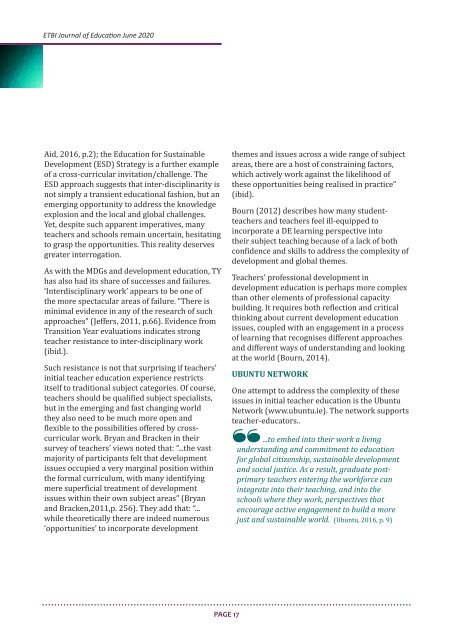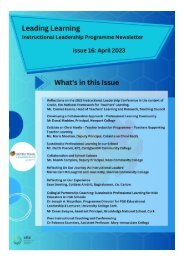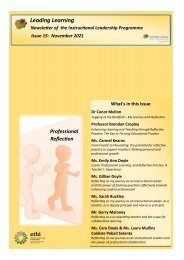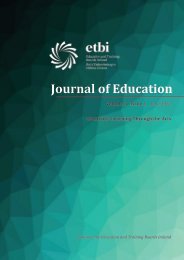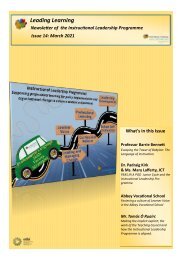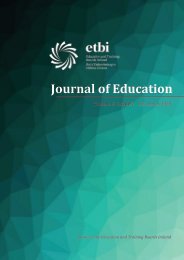ETBI Journal of Education - Vol 2:1 - June 2020 (Sustainable Development Goals 2015 -2030)
The theme of Volume 2 Issue 1 - Sustainable Development Goals 2015 -2030
The theme of Volume 2 Issue 1 - Sustainable Development Goals 2015 -2030
Create successful ePaper yourself
Turn your PDF publications into a flip-book with our unique Google optimized e-Paper software.
<strong>ETBI</strong> <strong>Journal</strong> <strong>of</strong> <strong>Education</strong> <strong>June</strong> <strong>2020</strong><br />
Aid, 2016, p.2); the <strong>Education</strong> for <strong>Sustainable</strong><br />
<strong>Development</strong> (ESD) Strategy is a further example<br />
<strong>of</strong> a cross-curricular invitation/challenge. The<br />
ESD approach suggests that inter-disciplinarity is<br />
not simply a transient educational fashion, but an<br />
emerging opportunity to address the knowledge<br />
explosion and the local and global challenges.<br />
Yet, despite such apparent imperatives, many<br />
teachers and schools remain uncertain, hesitating<br />
to grasp the opportunities. This reality deserves<br />
greater interrogation.<br />
As with the MDGs and development education, TY<br />
has also had its share <strong>of</strong> successes and failures.<br />
‘Interdisciplinary work’ appears to be one <strong>of</strong><br />
the more spectacular areas <strong>of</strong> failure. “There is<br />
minimal evidence in any <strong>of</strong> the research <strong>of</strong> such<br />
approaches” (Jeffers, 2011, p.66). Evidence from<br />
Transition Year evaluations indicates strong<br />
teacher resistance to inter-disciplinary work<br />
(ibid.).<br />
Such resistance is not that surprising if teachers’<br />
initial teacher education experience restricts<br />
itself to traditional subject categories. Of course,<br />
teachers should be qualified subject specialists,<br />
but in the emerging and fast changing world<br />
they also need to be much more open and<br />
flexible to the possibilities <strong>of</strong>fered by crosscurricular<br />
work. Bryan and Bracken in their<br />
survey <strong>of</strong> teachers’ views noted that: “...the vast<br />
majority <strong>of</strong> participants felt that development<br />
issues occupied a very marginal position within<br />
the formal curriculum, with many identifying<br />
mere superficial treatment <strong>of</strong> development<br />
issues within their own subject areas” (Bryan<br />
and Bracken,2011,p. 256). They add that: “...<br />
while theoretically there are indeed numerous<br />
‘opportunities’ to incorporate development<br />
themes and issues across a wide range <strong>of</strong> subject<br />
areas, there are a host <strong>of</strong> constraining factors,<br />
which actively work against the likelihood <strong>of</strong><br />
these opportunities being realised in practice”<br />
(ibid).<br />
Bourn (2012) describes how many studentteachers<br />
and teachers feel ill-equipped to<br />
incorporate a DE learning perspective into<br />
their subject teaching because <strong>of</strong> a lack <strong>of</strong> both<br />
confidence and skills to address the complexity <strong>of</strong><br />
development and global themes.<br />
Teachers’ pr<strong>of</strong>essional development in<br />
development education is perhaps more complex<br />
than other elements <strong>of</strong> pr<strong>of</strong>essional capacity<br />
building. It requires both reflection and critical<br />
thinking about current development education<br />
issues, coupled with an engagement in a process<br />
<strong>of</strong> learning that recognises different approaches<br />
and different ways <strong>of</strong> understanding and looking<br />
at the world (Bourn, 2014).<br />
UBUNTU NETWORK<br />
One attempt to address the complexity <strong>of</strong> these<br />
issues in initial teacher education is the Ubuntu<br />
Network (www.ubuntu.ie). The network supports<br />
teacher-educators..<br />
“...to embed into their work a living<br />
understanding and commitment to education<br />
for global citizenship, sustainable development<br />
and social justice. As a result, graduate postprimary<br />
teachers entering the workforce can<br />
integrate into their teaching, and into the<br />
schools where they work, perspectives that<br />
encourage active engagement to build a more<br />
just and sustainable world. (Ubuntu, 2016, p. 9)<br />
PAGE 17


